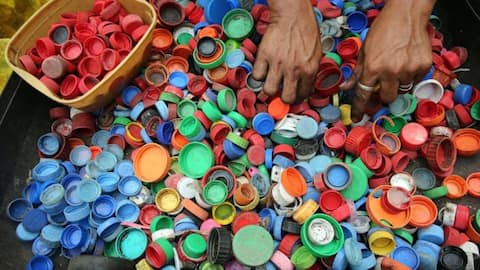Meet India's first cafe where you can pay in plastic
What's the story
In a bid to tackle the problem of plastic waste disposal and underfunded public facilities, Ambikapur city in Chhattisgarh has launched an innovative "garbage cafe." As India's first initiative of its kind, it allows ragpickers and the underprivileged to exchange collected plastic for food. The cafe serves as a platform where 1 kg of plastic waste can be exchanged for a full meal or 500 g of it for breakfast.
Recycling initiative
Plastic roads
The garbage cafe ensures collected plastic is not discarded but recycled, often mixed with tar to build durable roads. Launched in 2019, the initiative addresses plastic waste while providing meals for the homeless. Since then, nearly 23 tonnes of plastic have been collected, reducing landfill use. With its former dumping ground transformed into a park and a decentralized waste system in place, Ambikapur has emerged as a model "zero landfill" city.
National recognition
India's cleanest city
Ambikapur's innovative approach to waste management has earned it the title of India's cleanest city after Indore, Madhya Pradesh. The city follows a strict door-to-door collection and segregation of waste, treating all garbage generated within its limits. This meticulous system separates recyclable from non-recyclable waste, with organic waste being fed to cattle and the rest sent to a biogas plant.
Waste sale
Model for other cities
It takes its waste management a step further by selling 17 types of waste, including paper, plastics, and electronics, to recycling manufacturers. The city has also set aside ₹5.5 lakh for the cafe project with a contingency plan where elected representatives can donate their funds if required. Experts have praised Ambikapur's robust garbage disposal and segregation system as a model for other cities to follow.
Other initiatives
Global approaches to plastic waste management
Outside India, Cambodia has launched similar programs tackling both waste and hunger, where floating communities around the polluted Tonle Sap Lake can exchange collected plastic for rice. In Thailand, a ban on single-use plastic bags is the first step in a long-term waste management plan that promotes eco-friendly packaging, incentivizes recycling, sets standards for recycled content, and encourages "waste symbiosis," turning one sector's waste into another's valuable resource.
